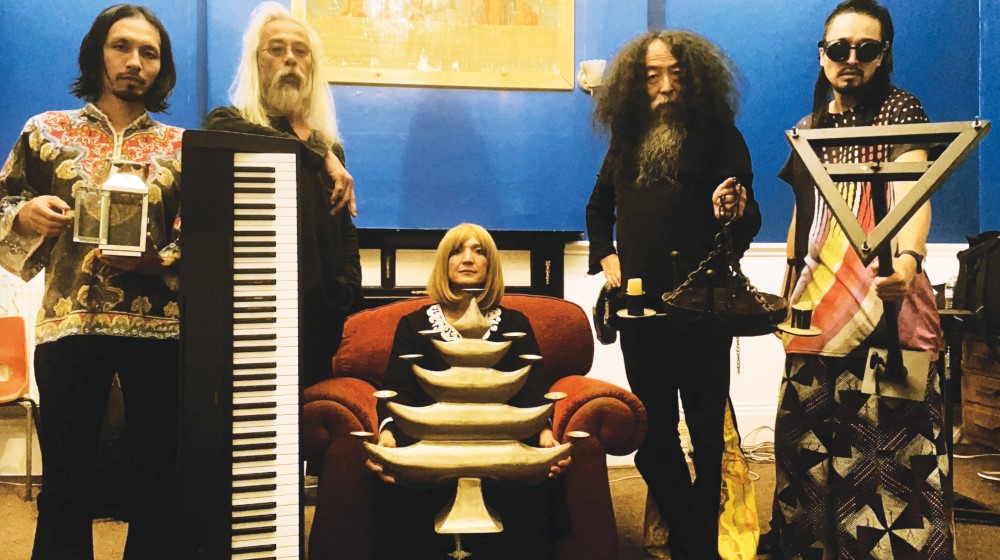Musical prophets without honor in their home country, Acid Mothers Temple & The Melting Paraiso U.F.O. have been making mind-melting psychedelic music for nearly three decades. The quintessential underground band is among the most prolific groups in all of music, and its free-wheeling, improvisational excursions have earned it a devoted cult. Led by guitarist, founder and mainstay Kawabata Makoto, the group comes to Santa Cruz’s Moe’s Alley for one performance on Nov. 9.
The origins of psychedelic rock – that is, rock music influenced directly or indirectly by the culture of consciousness-expanding drugs – extend back to the mid 1960s. Arguably the first-ever group to describe its music using that label was a Texas-based group, the 13th Floor Elevators. Both the Beatles and Grateful Dead were early leaders in the movement, one which eventually spread around the globe.
One of the least likely places for psych rock to have taken hold was Japan. Mid-’60s Japan was experiencing a homegrown cultural flowering of its own, thanks to figures like filmmaker Kurosawa Akira and printmaking artist Saitō Kiyoshi.
Pop music in Japan wasn’t immune to global trends: the so-called GS (“Group Sounds”) scene was a decidedly Japanese take on Western rock and pop styles like surf and garage rock. And by the late part of the decade, influential Japanese personalities who had visited places like London, New York and San Francisco brought back records, tapes and stories of the burgeoning psychedelic movement.
Yet the psych rock scene in Japan would remain quite small, and never really broke through to the wider public. “I don’t know so much about the Japanese underground scene,” says Kawabata, leader of Acid Mothers Temple, today the premier Japanese psychedelic group. “I’m not sure there was any psychedelic rock scene in ‘60s and ‘70s Japan.” He suggests what did exist was likely “just bizarre copies of Western music.”
Kawabata’s own musical journey began in 1978. And in those early days, few seemed to appreciate what he was doing. “Nobody could understand my music, so I couldn’t connect with them,” he says. But he followed his inspiration, making his own psychedelic rock, imbued with an Asian character.
Drawing not only from American and British styles, AMT often incorporates elements of noise (from avant-garde composers like Karlheinz Stockhausen) and drone (from the repetitive and hypnotic motorik of German “krautrock”).
The results are every bit as heady as a Grateful Dead “space” piece, but with a Japanese quality all its own. For his part, Kawabata characterizes AMT’s studio work as musique concrète, using recorded sounds as raw material.
The first official AMT album, Acid Mothers Temple & The Melting Paraiso U.F.O. was released in 1997. Asked how the album was received by the Japanese public, Kawabata laughs. “Totally no reaction,” he says. The media there ignored it, too.
But the five-track album (featuring a nearly 20-minute drone freakout titled “Speed Guru”) did get noticed. UK magazine The Wire named the album one of the year’s best. The group – a shifting cast of players with Kawabata as the guiding force – embarked on a busy schedule of concert tours around the globe. A staggeringly prolific outfit, AMT has released more than 100 albums to date.
While early psychedelic music pioneers found inspiration among the drug culture. Kawabata’s group stands apart from that tradition.
“All of my music comes from my cosmos,” he explains. “I catch music from my cosmos, and I play with instruments to people. So I don’t need anything like mind-altering substances.” His goal is to remove ego from the process. Because, he says, “my ego/personality gets in the way of reproducing music.”
And while flashing, colored lights and surreal projected visual images are often part of the psych-rock aesthetic. Kawabata says that his group doesn’t emphasize those things. The group often plays in near-darkness.
“I can’t even see my stage,” he says. “Anyway, the most important thing is the music; if people have their own [mental] images from our music, that’s the perfect visual for me.”
The music of Acid Mothers Temple is sometimes said to bring on a state of trance. Kawabata’s goals, though, are decidedly more down to earth. “Music is just music: nothing more, nothing less,” he asserts. “I want to make people happy. Only this.”
Acid Mothers Temple w/ Dead Leaf Echo + Mammatus, Thursday, Moe’s Alley.
$20 advance/$25 door/Doors 7pm / Show 8pm
21 and over













